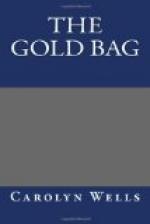The vanity case I knew to be a fad of fashionable women, and had that been monogrammed, it might have proved a clue. But, though pretty, it was evidently not of any great value, and was merely such a trifle as the average woman would carry about.
And yet I felt exasperated that with so many articles to study, I could learn nothing of the individual to whom they belonged. The gloves were hopeless. Of a good quality and a medium size, they seemed to tell me nothing. They were but slightly soiled, and apparently might have been worn once or twice. They had never been cleaned, as the inside showed no scrawled hieroglyphics. But all of these conclusions pointed nowhere save to the average well-groomed American woman.
The hair-pins and the silver money were equally bare of suggestion, but I hopefully picked up the bit of newspaper.
“Surely this newspaper clipping must throw some light,” I mused, but it proved to be only the address of a dyeing and cleaning establishment in New York City.
“This is being taken care of?” I said, and the burly inspector, who up to now had not spoken, said:
“Yes, sir! Nobody touches a thing in this: room while I’m here. You, sir, are of course an exception, but no one else is allowed to meddle with anything.”
This reminded me that as the detective in charge of this case, it was my privilege—indeed, my duty—to examine the papers and personal effects that were all about, in an effort to gather clues for future use.
I was ignorant of many important details, and turned to Parmelee for information.
That young man however, though voluble, was, inclined to talk on only one subject, the suspected criminal, Miss Florence Lloyd.
“You see, it must be her bag. Because who else could have left it here? Mrs. Pierce, the only other lady in the house, doesn’t carry a youngish bag like that. She’d have a black leather bag, more likely, or a — or a —”
“Well, it really doesn’t matter what kind of a bag Mrs. Pierce would carry,” said I, a little impatiently; “the thing is to prove whether this is Miss Lloyd’s bag or not. And as it is certainly not a matter of conjecture, but a matter of fact, I think we may leave it for the present, and turn our attention to other matters.”
I could see that Parmalee was disappointed that I had made no startling deductions from my study of the bag and its contents, and, partly owing to my own chagrin at this state of affairs, I pretended to consider the bag of little consequence, and turned hopefully to an investigation of the room.
The right-hand upper drawer of the double-pedestalled desk was open. Seemingly, Mr. Crawford had been engaged with its contents during the latter moments of his life.
At a glance, I saw the drawer contained exceedingly valuable and important papers.
With an air of authority, intentionally exaggerated for the purpose of impressing Parmalee, I closed the drawer, and locked it with the key already in the keyhole.




